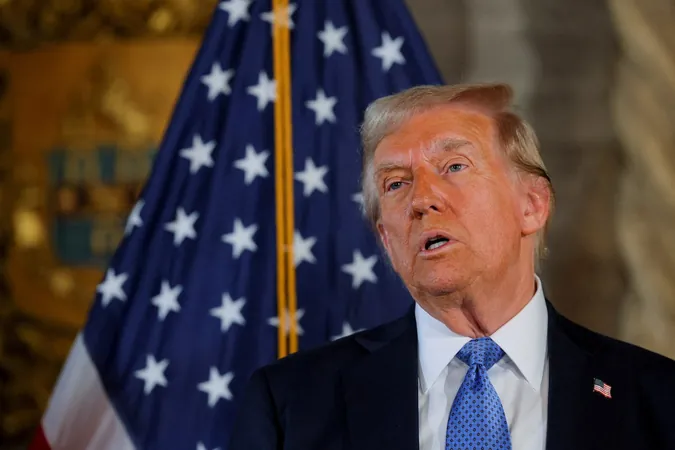
Trump Issues Stark Warning: Boost U.S. Energy Imports or Brace for Tariffs!
2024-12-20
Author: Benjamin
Trump's Call for Increased Energy Imports
In a bold statement on Friday, U.S. President-elect Donald Trump emphasized that the European Union (EU), the largest consumer of American energy, must significantly increase its imports of U.S. oil and gas. If not, he warned, the EU could face tariffs on its exports, which include popular goods such as cars and machinery. This provocation follows a contentious trade relationship and aims to shift the balance in favor of U.S. interests.
Current Energy Trade Between U.S. and EU
Current statistics indicate that the EU has been a substantial buyer of U.S. energy, and Trump made it clear he expects this to grow. “I told the European Union that they must make up their tremendous deficit with the United States by the large-scale purchase of our oil and gas,” Trump expressed on his Truth Social platform. His insistence on these imports comes alongside a promise to boost U.S. production capacities in the oil and gas sectors.
Challenges Facing U.S. Energy Exports
Despite Trump's aggressive stance, there's a complication. Presently, the United States is operating at full capacity in its energy exports, leaving no additional volumes available for immediate sale to the EU. Nevertheless, discussing energy cooperation remains a priority for both sides, with the European Commission signaling its readiness to explore ways to enhance their already strong ties, particularly in energy.
EU's Transition Away from Russian Energy
The EU has been proactive in transitioning away from Russian energy dependency, especially following the geopolitical turmoil sparked by Russia's invasion of Ukraine in 2022. A spokesperson for the European Commission reaffirmed their commitment to reducing reliance on Russian energy imports, with the U.S. stepping in as a vital supplier. In the first quarter of 2024, the U.S. accounted for a staggering 47% of EU liquefied natural gas (LNG) imports and 17% of its oil imports, showcasing the deepening energy relationship.
The Limits of Trump's Approach
However, Trump’s hardline tactics may be far from effective given that most European oil refiners and gas companies are private entities with limited governmental control over purchasing decisions. These companies typically prioritize price and efficiency over political whims.
Complex U.S.-EU Trade Dynamics
The current trade dynamics paint a complex picture. The U.S. has a significant goods trade deficit of €155.8 billion ($161.9 billion) with the EU, while services present a different story, revealing a surplus of €104 billion for the U.S. This has fueled Trump’s narrative around tariffs, as he aims to hold Europe accountable for what he describes as its unfair trade practices.
Future Prospects for U.S. Oil Production
Another area of caution comes from Europe’s increasing reluctance towards U.S. energy imports. Richard Price, an oil markets analyst, noted, “Europe is taking close to its maximum capacity for U.S. crude, meaning there is little scope for stronger imports next year.” Meanwhile, the International Energy Agency (IEA) predicts a slow growth trajectory for U.S. oil production until 2030, compelling the EU to seek a broader range of energy suppliers.
Looking Ahead: Cooperation or Confrontation?
As the U.S. looks to maintain its position as a global energy leader, it faces the dual challenge of meeting domestic demands—which are already at record levels—and supplying international markets. In 2023 alone, Europe constituted 66% of U.S. LNG exports, pointing to a critical reliance on American energy. Such developments evoke the question: Will the EU heed Trump’s warning? As tensions within the energy market escalate, only time will tell if cooperation or confrontation will dominate the agenda in the months ahead, especially with Trump set to take office on January 20. Speculation is rife—what will the fallout of this bold energy ultimatum be? Buckle up, the energy game is about to change!









 Brasil (PT)
Brasil (PT)
 Canada (EN)
Canada (EN)
 Chile (ES)
Chile (ES)
 España (ES)
España (ES)
 France (FR)
France (FR)
 Hong Kong (EN)
Hong Kong (EN)
 Italia (IT)
Italia (IT)
 日本 (JA)
日本 (JA)
 Magyarország (HU)
Magyarország (HU)
 Norge (NO)
Norge (NO)
 Polska (PL)
Polska (PL)
 Schweiz (DE)
Schweiz (DE)
 Singapore (EN)
Singapore (EN)
 Sverige (SV)
Sverige (SV)
 Suomi (FI)
Suomi (FI)
 Türkiye (TR)
Türkiye (TR)